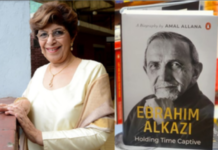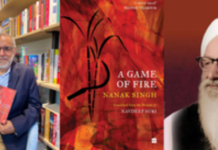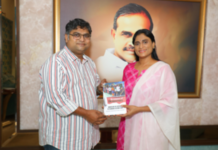New Delhi– Stories and narratives are fundamental to being human and children with access to good quality literature become a lot more engaged as citizens, says Amrita Patwardhan, Head of Education at Tata Trusts, which administers an annual Parag Honour List (PHL) that features a wide range of original writings across categories to promote access to good quality literature for children.
“Books help us make sense of our own experiences as well as help us open doors to experiences which we may never have in our individual lifetime. Children who have access to good quality literature not just thrive in terms of developing their language, but they also become a lot more engaged as citizens who are thinking individuals and it’s something that really widens their worldview,” Patwardhan told IANS in an interview.
“The reason why children need books and adults need books is essentially the same � it is to help us make sense of the world around us. For children, plays an additional role in supporting development of language and literacy skills. Being able to read with understanding and expressing ourselves are foundational skills on which all other learning in school depends. Children’s literature can play an important role in building these foundational skills among children,” she added.
The PHL is a part of the Tata Trusts’ Parag Initiative to catalyse the children’s literature ecosystem in India. Given gaps in the ecosystem at multiple levels, while Parag works with publishers to develop good quality content, especially in Indian languages and runs libraries, it also helps librarians grow professionally to strengthen the circle of reading.
In its third edition, the Parag Honour List 2022 features 38 books in English and nine in Hindi across the genres, whittled down from over 200 entries received from 23 Indian publishers for books published between October, 2020 and September, 2021.
Noting that stories and narratives are “fundamental to being human”, Patwardhan said the human mind thrives on stories, and there is increasing evidence from evolutionary biology, psychology, and neuroscience to back this.
“Oral and written stories develop imagination, creativity, and help us make sense of the world around us. Stories are also powerful ways in which we imagine a different world. Stories help us understand ourselves as well as those we have never met. Stories have that power.
“When reading stories, illustrations in picture books open the visual imagination to fuel several competencies in children including curiosity and creativity. This helps children find things that they can relate to and get curious to learn more about. Reading plays a dual role for kids, where on one hand, it helps them comprehend their surroundings, and it also opens doors to new experiences, cultures, traditions, geographies, and perspectives,” Patwardhan explained.
Of late, she said, there has been a lot of work coming out of neuroscience and psychology which looks at symbols and languages as something very central to being human.
“Research also dwells on how �the story’ as a format and narrative is important to help human beings make sense of the world around them. The first entry point into the world of books needs to be in the language that the child is most comfortable with – their mother tongue.
“Gradually, books can also be used to learn different languages and master skills. For younger kids, the first thing that they look at in any book is the pictures. Illustrations help kids anchor and deepen their understanding of the stories and develops their aesthetic sense and imagination in a variety of ways,” she added.
Thus, supporting and fuelling the love of reading in children as parents, educators, and care givers can help foster their emotional growth.
“Experiences of read aloud with parents or teachers helps form positive association with reading as an enjoyable activity to look forward to. Stories have the power to help develop empathy, patience, and the ability to put themselves in another’s shoes,” Patwardhan maintained.
While children learn a lot through observation and imitation and actively construct their own meanings, “it is very well established in education research that children who grow up in homes where parents and caregivers read for enjoyment are more likely to start associating joy and pleasure with books, much before they can read and write themselves. So, it’s important for parents and caregivers to help children form positive associations with reading by making reading enjoyable, not just a necessity associated with exams,” she said.
One way to start, especially when children are young, is by creating a print-rich environment through easy access to variety of meaningful reading material. Research also shows that children who have been read out to, through bedtime stories or reading sessions at school, have a richer vocabulary.
“However, this is not a reality for a lot of children in India. Access to quality literature in schools is important for every child, but it is particularly important for children who come from non-literate homes. Here is where the school and the school library can play an active. Well-curated libraries at both community and school level, and a teacher who enjoys reading herself becomes very central,” Patwardhan said.
To this end, Tata Trusts, through The Parag Honour List Book Box initiative, provides outstanding books of the year to non-profit organisations, libraries, schools, home libraries, and learning centres that have been doing meaningful work in the library space.
“Through this initiative we prioritize libraries serving children in underserved communities. In the past two years, we have been able to send more than a 100 PHL book boxes to libraries which are running in very remote areas in more than ten States and reaching children in far corners India,” Patwardhan concluded. (IANS)














